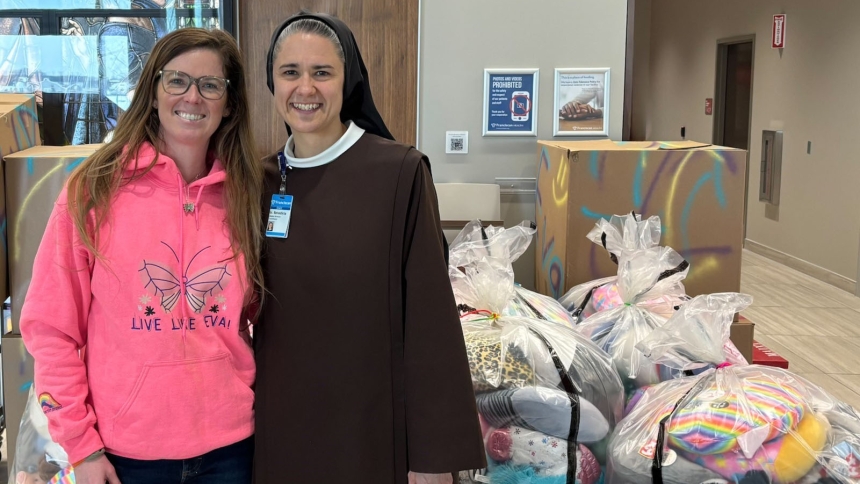
As published in the Northwest Indiana Catholic on May 21, 2017
The liturgy of the Easter season presents John’s Gospel to us. The most complex and the last written, this fourth Gospel shows Jesus in the fullness of his divinity and as the One come in search of us, wanting each person to share in the relationship he enjoys with the Father. Influenced by Greek philosophy and proclaiming a high Christology, John’s Gospel is nevertheless deeply personal.
In different contexts, Jesus speaks of how he is in the Father and the Father is in him; how he dwells in his disciples and they abide in him; that as the Father sent him, so he sends his apostles; and that “we (the Blessed Trinity) will come and make our dwelling” in anyone who keeps the Lord’s commandments. When I read John’s Gospel, I imagine concentric circles of life, with Christ at the center leading us into full relationship with the Trinity. This dwelling of God within us is sanctifying grace which we receive in the sacraments.
Beginning with baptism, God comes to live in us, pitching his tent within our spirit, making our life his own and penetrating the details of our existence with gentle grace and abiding love. St. Teresa of Avila says that the Lord wants to make our hearts his throne and reign within our souls. When sin obscures this divine indwelling within us, the sacraments restore what’s been lost. We have all experienced those sacramental moments when the Eucharist, reconciliation, anointing of the sick or confirmation have deepened the life of God within us.
How different the world would be if all people lived with the profound awareness of this sanctifying grace, both within themselves and everyone else.
Often, when I speak to people who don’t go to church regularly, they say, “I don’t need to go to church to be a good person.” I readily agree. We can love, serve and help others without weekly Mass. This comment, however, implies that our faith is simply about ethics, what we do, and is a fundamental misreading of Christianity and the Gospel. Jesus came to transform who we are in addition to calling us to a higher level of moral action. The sacraments consecrate us as beloved children of the Father - brothers and sisters of Jesus Christ and temples of the Holy Spirit.
Through his death and resurrection, Jesus freely shares with us the relationship he enjoys with the Father. He becomes the door through which we enter into the sacred reality of the Most Blessed Trinity. Our faith is fundamentally about who we are before it is about what we do.
I cannot receive that sacramental grace or depth of relationship with God by walking in the woods on Sunday morning, reading the Bible on my own, or living by self-created ethical standards, as good as all of those actions may be.
I need the Church; I belong to the family of faith. I need the sacraments and the formal proclamation of the Gospel within the gathered assembly. Christianity is not a solitary exercise, despite what our hyper-individuated age may believe.
This unity - Christ dwelling within us, us abiding in him, Jesus in the Father and the Father in him - becomes the very meaning and identity of our lives. The Church becomes the extension of the Trinitarian life of God through time and space, until the consummation of human history.
We can only properly understand the mystery of marriage and the gift of family, understand the meaning of the Church and our place in her, and the proper relationship among the various levels of the Church - individual disciple, parish, diocese and global Catholicism and indeed all human relationships - through the lens of this divine unity.
As a bishop, I am in unity with the Holy Father and my fellow bishops. Our priests are in unity with me and share in my episcopal ministry. Our people are in unity with their pastors and leaders, and together we are all bound together in Christ, who leads us to the Father in the power of the Holy Spirit.
When we stand apart from that unity, even with logical reasons and good intentions, we become outliers, rugged individualists who, in going our own way, cease walking with the family.
Is the Church filled with imperfect sinners? Yes, and we must readily admit that we are. Is family life hard and frustrating? Yes. Can’t we do things more efficiently without the plodding need to bring everybody else along? Yes. Nevertheless, the unity of the Church is a paramount value for us Catholics.
I’ve always been struck by the comment of Leonardo Boff, a Brazilian theologian who was silenced for a number of years by the Vatican. “I would rather walk together with my Church than alone with my theology.” Years later, things reached a point of estrangement between him and Rome, but that original response still stands as a statement of unity.
As we approach our upcoming synod - this “walking together” - the Holy Spirit is calling us to a deeper commitment to and experience of this beautiful unity with God, the Church, each other and the world.
Since religion is ultimately about relationship, since Christ’s fundamental mission is to lead us into the eternal life of the Trinity, then we can never afford to let our bonds of family atrophy or break. Jesus’ heart-felt prayer at the Last Supper was that we may all be one.
I pray that our synod may both express and strengthen that unity which comes from the very heart of the Lord.
+ Donald J. Hying



